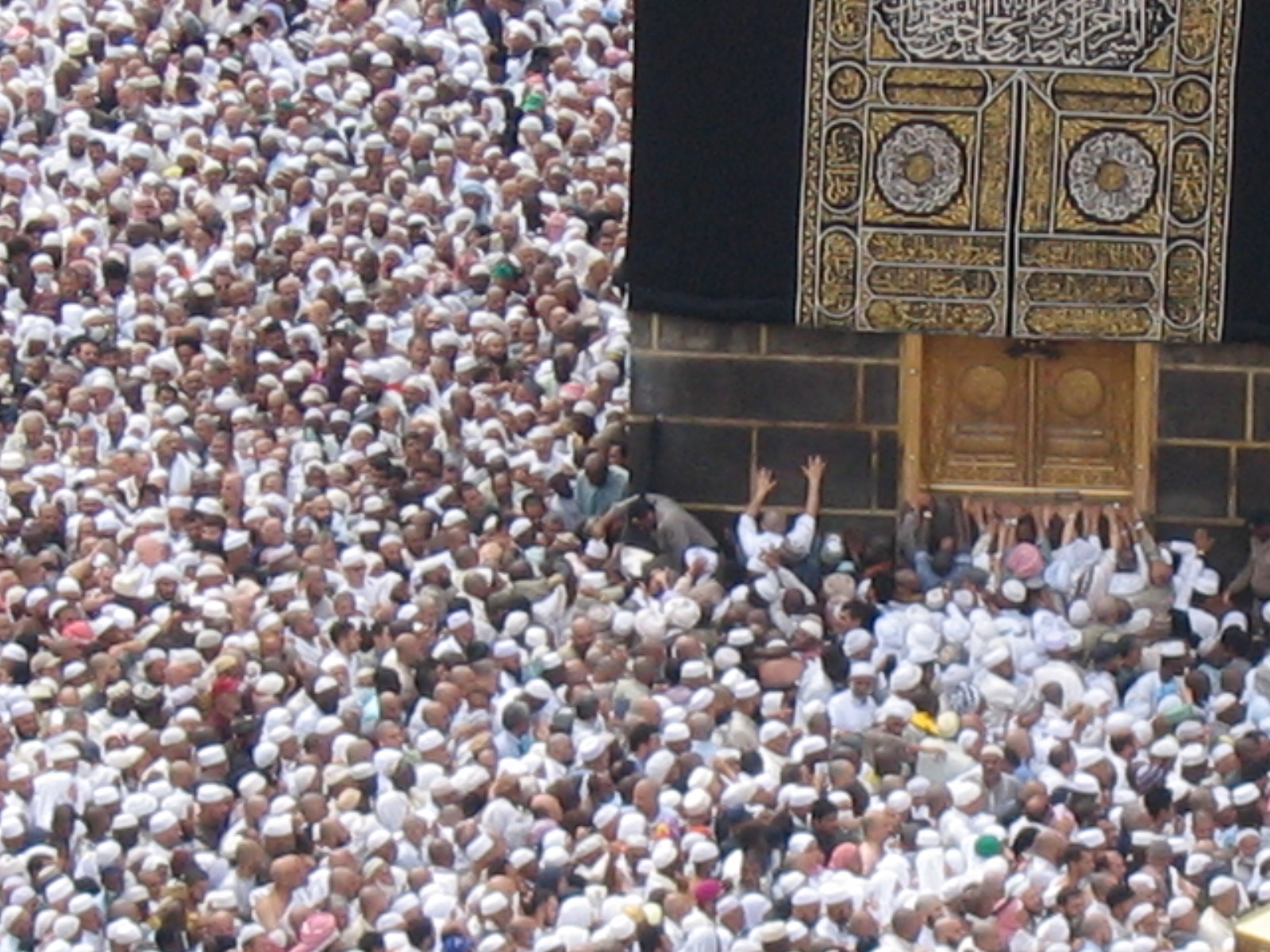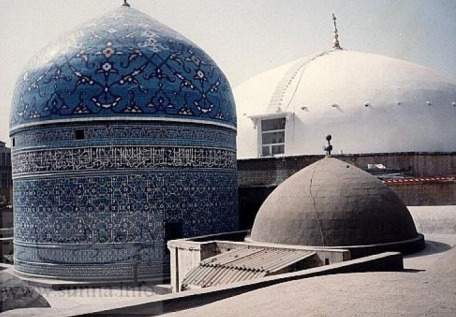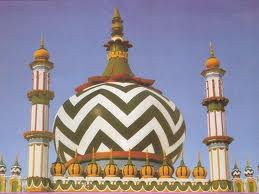Category Archives: Personalities
Big Nights and Days of Islam: Dhul Hijjah
In the Name of Allah, The Beneficent, The Merciful
Prayers and Peace upon His Noble Messenger
Â
Dhul Hijjah is the 12th and last month of the Islamic lunar calendar. It is one of the four sacred months, the other three being Muharram, Rajab Dhul Qa’dah. Only Rajab is on its own, the other three come together. Dhul Hijjah’s significance is enormous as related in the Holy Quran, and the sayings of the Holy Prophet sal Allahu alayhi wa sallam and His Noble Companions (may Allah be pleased with them all).
Allah, Almighty and Glorious is He, says in the Holy Quran:
“And by oath of ten nights.â€
                                                                                   [Al-Fajr 89:2]
Hazrat Ibn Abbas (may Allah be pleased with him and his father), the great Companion of the Holy Prophet sal Allahu alayhi wa sallam and illustrious exegete of the Holy Quran explained that the expression “and ten nights [wa layaalin ‘ashr]†refers to the ten special nights at the beginning of the month of Dhul Hijjah.
Hazrat Abu Saeed al-Khudri (may Allah be pleased with him), another great Companion of the Holy Prophet sal Allahu alayhi wa sallam reported that the Holy Prophet sal Allahu alayhi wa sallam said:
“The chieftain [sayyid] of the months is the month of Ramadan, and the mightiest of them in sanctity [hurma] is Dhul-Hijjah.â€
According to Hazrat Abu Huraira (may Allah be pleased with him), the Holy Prophet sal Allahu alayhi wa sallam said that:
“Of all the days, there are none in which Allah, Exalted is He, more dearly loves to have worshipful service performed for His sake, other than the Ten Days of Dhul Hijjah. To devote just one of the them to fasting is equivalent to fasting for one whole year, and keeping vigil on one of these nights is like keeping vigil for one whole year.â€
Narrated Hazrat Ibn Abbas radi Allahu anhuma: The Prophet alayhi salatu wa salaam said,
“No good deeds done on other days are superior to those done on these (first ten days of Dhul Hijjah).†Then some Companions radi Allahu anhum of the Prophet alayhi salatu wa salaam said, “Not even Jihad?†He alayhi salatu wa salaam replied, “Not even Jihad, except that of a man who does it by putting himself and his property in danger (for Allah’s sake) and does not return with any of those things.†[Bukhari Shareef, Volume 2, Book 15, Number 86]
Sayyidina Abu Hurairah radi Allahu anhu reported that the Prophet sal Allahu alayhi wa sallam said,
“None of the days are dearer to Allah during which He is worshipped than the ten days of Dhul Hijjah. Fasting on each of these days is like fasting for a year and standing (in worship) on each of its nights is like standing on Laylatul Qadr.†[Jami’ At-Tirmidhi Hadeeth #758, Ibn Majah Hadeeth #1728]
***
Hazrat Ali (may Allah ennoble his face) reported that the Holy Prophet sal Allahu alayhi wa sallam once said:
“When the Ten [Days and Nights] of Dhul-Hijja come around, you must devote yourselves strenuously to worshipful obedience, for they are the days upon which Allah, Exalted is He, has bestowed His special favor, and He has made the sanctity of their nighttime equivalent to the sanctity of their daytime. So if a worshipper prays during any night of the Ten Nights, performing four cycles of ritual prayer [raka’at] in the last third [of the night], and including the following recitations from the Holy Quran in each cycle:
Â
- Surah Al-Fatiha [1:1-7] once
- Surah Al-Falaq [113:1-5] Surah An-Naas[114:1-6] once each
- Surah Al-Ikhlaas [112:1-4] 3 times and
- Ayat Al-Kursi [2:255] 3 times
Â
and if he raises his hands, as soon as he has completed this ritual prayer and says:
Â
Subhaana Dhil-‘Izzati wal-Jabaroot. Subhaana Dhil-Qudrati wal-Malakoot. Subhaanal-Hayyil-ladhee laa yamoot. Laa ilaaha illa Huwa yuhyee wa yumeetu wa Huwa Hayyun laa yamoot. Subhaanal-laahi Rabbil-‘ibaadi wal-bilaad. Al-hamdu lil-laahi katheeran wa tayyiban wa mubaarakan ‘alaa kulli haal. Allahu Akbaru kabeera Rabbanaa jalla Jalaaluhu wa Qudratuhu bi-kulli makaan.
Â
and if he then pleads for whatever he wishes, he will be entitled to the same reward as someone who perform the Pilgrimage to the Sacred House of Allah, visits the tomb of the Prophet y and strives in the cause of Allah. Whatever he asks of Allah, He will surely grant him his request.
Â
If he performs that same ritual prayer during every night of the Ten Nights, Allah, Exalted is He, will grant him lawful access to the Highest Paradise [al-Firdaws al-A’laa] and He will erase every bad deed from his record. ‘Now set about your work from a new beginning,’ he will be told.
Â
If it happens to be the Day of ‘Arafa, and he devotes the daytime thereof to fasting and night thereof to ritual prayer, and he pronounces this invocation and he offers many a humble entreaty in the presence of Allah, Exalted is He, Allah will say: ‘O My angels, bear witness that I have granted him forgiveness, and that I have equated him with the Pilgrim of the House of Allah [al- Haajj ilaa Baitillah].’ The angels will be delighted to learn what Allah, Exalted is He, has bestowed upon that believing servant, as a reward for his ritual prayer and his invocation.â€
***
Hazrat Ibn Abbas (may Allah be pleased with him and his father) said:
We were in the company of Allah’s Messenger sal Allahu alayhi wa sallam, when a group of people arrived from Yemen. They said: “May our mothers and fathers be our ransom! Will you tell us about the special merits of the Pilgrimage [Hajj]?†He sal Allahu alayhi wa sallam said:
“Yes! If any mans sets out from his home, as a Pilgrim or a Visitant, whenever he lifts a foot, or sets a foot down on the ground, sins are scattered from his feet, just as leaves are scattered from the trees. Then, when he reaches the city of Medina, shakes my hand, and salutes me with the greeting of peace [salaam], the angels will likewise salute him with the greeting of peace. Then when he reaches Dhul Haleefa (the miqat or meeting point for Pilgrims approaching Mecca from the direction of Medina), and performs the major ritual ablution, Allah will purify him of his sins. When he puts on two new pieces of clothing, Allah will renew his good deeds for him….†(Please refer to the source text for the entire Hadeeth, which is quite extensive.)
***
Â
Hazrat Ibn Umar (may Allah be pleased with him and his father) said that he heard Allah’s Messenger sal Allahu alayhi wa sallam say:
“Allah, Exalted is He, inspects His servants on the Day of ‘Arafa, and if there is an atom’s weight of faith [imaan] in the heart of any one of them, He grants them forgiveness without fail.â€
Fasting on the 9th of Dhul Hijjah
Hazrat Abu Qatada al-Ansari (Allah be pleased with him) reported that the Messenger of Allah (may blessings and peace be upon him) … was asked about fasting on the day of ‘Arafa (9th of Dhu’I-Hijja), whereupon he said:
“It expiates the sins of the preceding year and the coming year….†[Sahih Muslim, Book 006, Hadeeth #2603][1]
Â
Ritual Prayer to Be Recited on the 9th of Dhul Hijjah
Hazrat Abu Huraira (may Allah be pleased with him) said that the Holy Prophet sal Allahu alayhi wa sallam said:
“If someone performs four voluntary cycles of ritual prayer, on the Day of ‘Arafa, between the Dhuhr and ‘Asr reciting in each cycle Surah Al-Faatiha one time, and Surah Al-Ikhlaas 50 times, one million good deeds will be recorded in his credit column. For every letter in the Quran, he will be promoted by one level in the Garden of Paradise, the distance between each level and the next being a journey of fifty years…†(Please refer to the source text for the remaining benefits of performing this prayer.)
Also, in another traditional report, Hazrat Abdullah ibn Masud (may Allah be pleased with him) said that the Holy Prophet sal Allahu alayhi wa sallam said:
“If someone performs two voluntary cycles of ritual prayer on the Day of ‘Arafa, reciting in each cycle:
Â
- Surah Al-Faatiha 3 times, each beginning with the Basmala (Bismillaahir-rahmaanir-raheem) and ending with Aameen,
- Surah Al-Kaafiroon [109:1-6] 3 times, and
- Surah Al-Ikhlaas once, beginning each time with the Basmala,
Â
Allah (Exalted is He) will surely say [to the angels]: ‘Bear witness that I have granted him forgiveness for his sins.’â€
***
Â
In the ritual prayer of the Night of Sacrifice (i.e. the night preceding the day of Eid), the worshipper must perform two cycles of prayer, reciting in each cycle:
- Surah Al-Faatiha 15 times, and
- Surah Al-Ikhlaas 15 times, and
- Surah Al-Falaq 15 times, and
- Surah An-Naas 15 times
After concluding the prayer he should:
- recite Ayat-ul-Kursi 3 times
- seek forgiveness of Allah 15 times, and then:
- appeal for whatever he wishes from the good of this world and the Hereafter.
Â
When the believer sets out to attend the Festival prayer, following a particular route, he is recommended to return home by a different route. This advice is based on the report of Hazrat Ibn Abbas (may Allah be pleased with him and his father) who said that the Holy Prophet y took one road [to the congregational prayer] on the Day of the Festival, and used a different road on His way back home.
Udhiyya (Qurbani)
Â
The animal sacrifice (udhiyya /qurbani) is a customary practice (Sunnah) in the Hanbali, Maliki, and Shafi madhhabs, the omission of which is not recommended for anyone who is capable of performing it. In the Hanafi it is strictly necessary (wajib) (technically same as Fard in terms of implementation).
***
We pray that Allah, Most Glorified and Exalted is He, by the waseela (connection) of His Beloved Prophet (Prayers and Peace be upon Him) accepts the Hajj of all those who had the good fortune to go this year and may He grant the opportunity to those who desire the journey in future years. May He forgive our faults and accept our worship and make us true servants of His Noble Friends (Awliya Kiram). Aameen.
[1] Part of a larger Hadeeth text
The Love of Allah: An act of free choice or an involuntary compulsion?
Shaikh ‘Abd al-Qadir al-Jilani, rehmatullahi ta’aala alayhe on the love of Allah – part of a discourse given in AH 545 in Baghdad sharif – 888 years ago shared by Ruslan Moore and translated by the late Muhtar Holland (may Allah have mercy upon his soul):
At this point someone asked: “Do you see love [mahabba] as being experienced in the first instance because of an involuntary compulsion [idtiraran], or by an act of free choice [ikhtiyaran] ?â€
By way of reply, the Shaikh (may Allah be well pleased with him) went on to say:
In the case of a few isolated individuals, the Lord of Truth (Almighty and Glorious is He) simply casts His gaze upon them and He loves them. He shifts them from one thing to another in a single instant. He does not
come to love them gradually, more and more as the years go by. He loves them in a single moment, so they love Him too, of necessity. They notice that all the blessings they have received have come from Him, not from any other. They notice all His kindness and tender loving care, and all the gifts He bestows upon them, so they love Him promptly and immediately, without any gradual process or passage of time.
In the case of the vast majority, however, it is a matter of choice. Lovers begin to choose Allah (Exalted is He) in preference to His creatures, then they start choosing Him in preference not only to this world, but also to the hereafter. They start giving up things that are either strictly unlawful [haram] or merely of dubious legality [shubha], then they cut back on their consumption of things that are lawful [halal]. They prefer to lead a very simple life, making do with basic things that are readily available. They shun bed and blankets, sleep and rest.
Their sides shun their couches [as they call on their Lord in fear and hope]. (32:16)
Their night is no longer an ordinary night, and their day is no longer an ordinary day. They say: “Our God [Ilahana], we have left everything behind the backs of our hearts, and we have hastened toward You, so that
You might be well pleased.†They journey toward Him on the feet of their hearts [qulub], sometimes on the feet of their innermost beings [asrar], sometimes on the feet of their earnest intention [irada], sometimes
on the feet of their aspiration [himma], sometimes on the feet of their genuine sincerity [sidq], sometimes on the feet of their love [hubb], sometimes on the feet of their ardent longing [shawq], sometimes on the feet of their meekness [dhull] and their modest humility [tawadu’], sometimes on the feet of their fear [khawf], sometimes on the feet of their hope [raja ‘], and all of this out of love for Him and eager yearning to meet with Him.
In your own case, O questioner, you belong to the group consisting of those who love Allah (Almighty and Glorious is He) both through involuntary compulsion [idtiraran] and through a process of free choice
[ikhtiyaran]. So, since your question cannot be answered simply, either this way or that, you had better hold your tongue and concentrate on practicing Islam as it ought to be practiced!
If only you could experience all that Islam and faith [iman] can mean! If only you would leave the company of the unbelievers [kafirin] and the hypocrites [munafiqin] today, and stay away from them tomorrow. If only you would get up and walk away from meetings held by those who idolize their fellow creatures and material means [al-mushrikin bi ’l-khalq wa ’l-asbab], and who quarrel with the Lord of Truth (Almighty and Glorious is He)! You must repent and mend your ways. Do not meddle with the treasuries of worldly kings, and do not pry into their secrets.
Shaikh Hammad (may Allah the Exalted be well pleased with him) would often say: “If a person does not acknowledge his own worth, the decrees of destiny will teach him to acknowledge his own worth [man lam
ya’raf qadrahu ‘arrafat-hu ’l-aqdaru qadrah].†To recognize your own worth is better than refusing to acknowledge your own worth, because an ignorant person is someone who knows neither his own worth nor the worth of other people.
O Allah, do not include us among the ignorant, lying pretenders!
O Allah, include us among those of Your creatures who enjoy Your special favor, and:
Give us in this world good, and good in the hereafter, and guard us against
the torment of the fire! (2:201)
Ahmed Raza Khan (ra) – The 20th Century Reviver of the Faith
|
The Reviver (Mujaddid) of the 14th Century AlaHadrat Imam Ahmad Rida Khan Alaihir raHmah
He restored the deen to its original state in India when falsehood was being mixed with the truth and people were confused about Sunni beliefs and practices. Such a person is known as a “Mujaddidâ€. Hadrat Umar (may Allah be pleased with him) narrates the Messenger of Allah (peace and blessings upon him) said:
Hadrat Abu Hurayrah (may Allah be pleased with him) narrates the Noble Prophet (upon him peace and blessings) said:
|
He wrote his first ever fatwa on 14th Sha’ban 1286h on an issue of fostering (when he was only 13 years, 10 months and 4 days old!)
Imam Ahmed Rida took his spiritual pledge (bay’ah/ahd) and received khilafah in various Sufi pathways from his spiritual teacher , Sayyid Shah Aal-e-Rasul Ahmadi from Marehrah, India, in 1296H.
Travels to Hajj
First Hajj:Â In 1295h (1878 CE), at the age of 22, the great Imam traveled to perform Hajj with his father where he received Ijazahs (licenses to teach) in the traditional sciences from the great scholars of Makkah such as Sayyid Ahmad Zayni Dahlan and Mufti Abdullah bin Abd ar-Rahman Siraaj.
Event: It is narrated that Imam Ahmed Rida was near Maqam Ibrahim after Maghrib salah one evening that the Shafi’I Imam of Masjid al-Haraam Shaykh Salih Jamal al-Layl Makki (d.1320h/1884) greeted him and said: “I swear by Allah, I can see the light of Allah shine in your foreheadâ€Â and presented Ijazahs to him.
Second Hajj:Â In 1323h (1906 CE), Imam Ahmed Rida travelled to the Two Holy sanctuaries for the second time in company of his brother, Mawlana Hassan Raza Khan and son, Mawlana Hamid Raza Khan.
Event: He wrote a book called “Al-Dawlah al-Makkiyyah†in Arabic in this journey in just over eight hours without using any books on a question proposed to him by the Sharif of Makkah on the Noble Prophet ‘s (may Allah give him peace and blessings) knowledge of the unseen (ilm al-gayb). This work received a tremendous acceptance in its recital gathering in the presence of the Sharif which was attended by the prominent scholars of the time.
In the same journey, he had numerous meetings of knowledge and circles with the great Ulama who were either teaching, living or traveling in Hijaz. He produced a number of books in Arabic due to these sittings and circles …

















